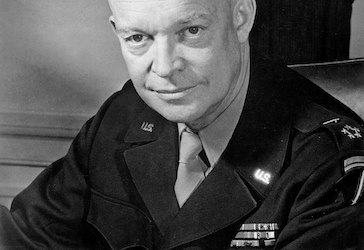

Dwight D. Eisenhower (1890-1969, age 79). An American military officer and statesman who served as the 34th U.S. president from 1953 to 1961. Nicknamed “Ike.”
Born in Texas, and raised in Kansas, Eisenhower graduated from West Point in 1915. During World War II, Eisenhower rose to prominence as a military leader. He served as Supreme Commander of the Allied Expeditionary Force in Europe, achieving the five-star rank of General of the U.S. Army.
He planned and supervised two crucial military campaigns:
- Operation Torch in North Africa (1942-1943), and
- The Invasion of Normandy in 1944.
After the war, Eisenhower served in various high-ranking positions, including Army Chief of Staff (1945-1948), president of Columbia University (1948-1953), and the first supreme commander of NATO (1951-1952).
As president, Eisenhower focused on maintaining peace during the Cold War era. He ended the Korean War, strengthened European alliances, and promoted technological innovation. He was responsible for the construction of the U.S. Interstate system.
[In 1919, the U.S. Army sent an expedition across the U.S. to determine the difficulties military vehicles would have on a cross-country trip. Leaving from Washington, D.C. they drove 62 days and 3,200 miles (5,100 km) to San Fransisco. Eisenhower, then a 28-year-old lieutenant colonel, took part. In addition, he had been impressed with Germany’s Autobahn as a necessary component of a national defense system while he was serving as Supreme Commander in Europe.]
Domestically, he balanced the budget, facilitated the Civil Rights movement, and warned of the dangers of the “Military-Industrial Complex” in his farewell address.
Initially underestimated by some historians, Eisenhower’s presidency has been reevaluated more positively in recent decades. He is now generally ranked among the top quartile of U.S. presidents, praised for his mature judgment, prudence, and ability to maintain peace during challenging times in international relations.
